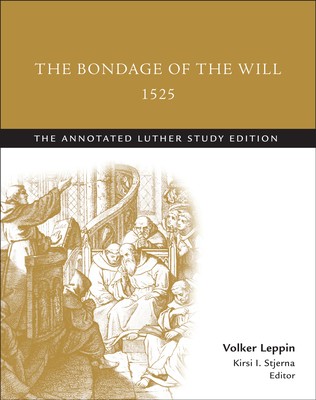
- We will send in 10–14 business days.
- Author: Kirsi I Stjerna
- Publisher: Fortress Press
- ISBN-10: 1506413455
- ISBN-13: 9781506413457
- Format: 18.8 x 23.1 x 0.8 cm, minkšti viršeliai
- Language: English
- SAVE -10% with code: EXTRA
Reviews
Description
In autumn 1525, Luther wrote The Bondage of the Will as a response to humanist and theologian Erasmus of Rotterdams On Free Will.
Luthers treatise is important on four accounts: First, Luther wanted to show his own humanist education. Second, against Erasmus, who had maintained that the question of free will could not be decided just on the basis of the Bible, Luther stressed the clarity imbedded in Scripture. Third, Luther stressed that his denial of the free will pertained to the issue of salvation, while in other areas of life not relevant for this fundamental existential matter, free will could be acknowledged. Finally, he introduces the distinction of the revealed and the hidden God to make clear that a Christian must focus on God as shown in Jesus Christ rather than speculating about Gods potency in general. Luthers argument on the matter of the bound and free will poses a challenge and an invitation for constructive contemporary theology.
This volume is excerpted from The Annotated Luther series, Volume 2. Each volume in the series contains annotations, illustrations, and notes to help shed light on Luthers context and to interpret his writings for today.
EXTRA 10 % discount with code: EXTRA
The promotion ends in 21d.16:33:13
The discount code is valid when purchasing from 10 €. Discounts do not stack.
- Author: Kirsi I Stjerna
- Publisher: Fortress Press
- ISBN-10: 1506413455
- ISBN-13: 9781506413457
- Format: 18.8 x 23.1 x 0.8 cm, minkšti viršeliai
- Language: English English
In autumn 1525, Luther wrote The Bondage of the Will as a response to humanist and theologian Erasmus of Rotterdams On Free Will.
Luthers treatise is important on four accounts: First, Luther wanted to show his own humanist education. Second, against Erasmus, who had maintained that the question of free will could not be decided just on the basis of the Bible, Luther stressed the clarity imbedded in Scripture. Third, Luther stressed that his denial of the free will pertained to the issue of salvation, while in other areas of life not relevant for this fundamental existential matter, free will could be acknowledged. Finally, he introduces the distinction of the revealed and the hidden God to make clear that a Christian must focus on God as shown in Jesus Christ rather than speculating about Gods potency in general. Luthers argument on the matter of the bound and free will poses a challenge and an invitation for constructive contemporary theology.
This volume is excerpted from The Annotated Luther series, Volume 2. Each volume in the series contains annotations, illustrations, and notes to help shed light on Luthers context and to interpret his writings for today.


Reviews